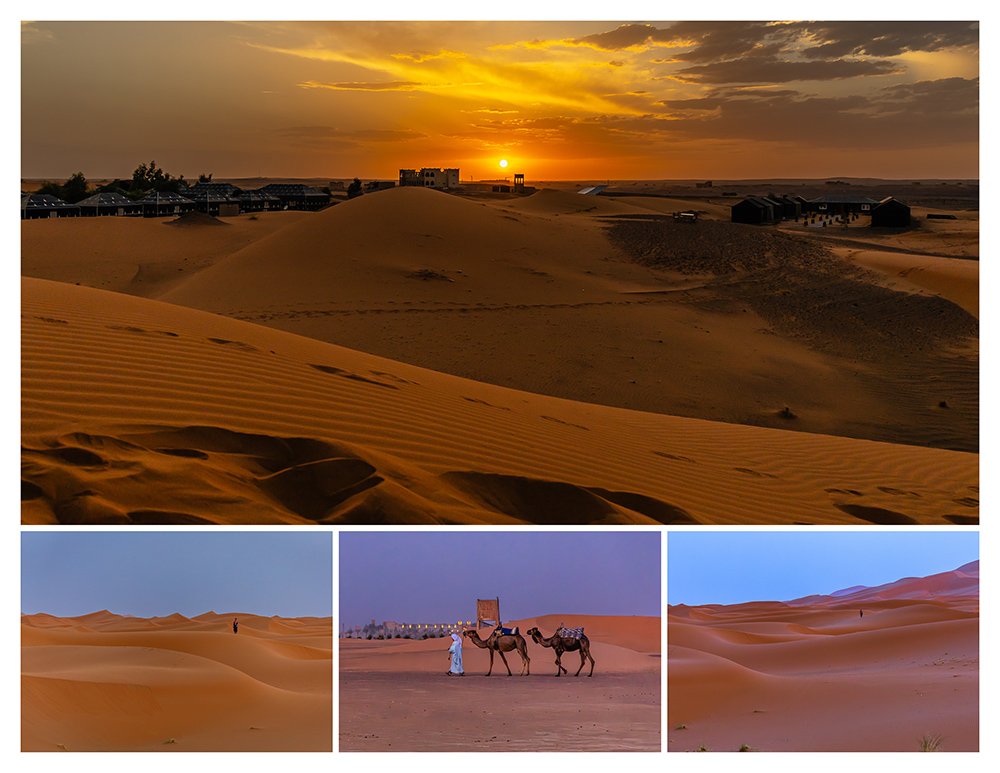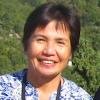Tuareg for a Day in the Moroccan Sahara
/We drove through stunning scenery in the Atlas Mountains with its gorges and oases, big cities, old capitals, rural towns, kasbah upon kasbah, minaret upon minaret, each carrying its own history, colors, patterns, sounds, tastes and smells. Everywhere, we met warm and friendly Moroccans, both the indigenous Berbers as well as Arabs. Each place we visited was fascinating, but the best part for me was the day spent in the Moroccan Sahara, home of the Tuareg, a nomadic Berber tribe. In those 24 hours, I got a heavy dose of the unfamiliar: people, culture, history and landscape – all unique, eye-popping and heartwarming, leaving me hungry for more.
The Milky Way in Morocco, the hotel in Erfoud, and Salim, the hotel security guard (Photos by Odette Foronda)
Your phone ring-dings and you try to grab it in the dark. You realize that you had set the alarm for 4:00 a.m., and that you’re in Erfoud right next door to the Moroccan Sahara. Still in your nightclothes, you pick up your camera and tripod and head out to the courtyard pool. After looking around, you’re convinced it’s safe. Then you look up the sky for the reason you got up: millions of glittering stars that take you back to your childhood nights in Vintar, Ilocos Norte oh-so-long ago when you had no electricity. After having since lived in big cities for ages and missing the starry nights, you still can find the Milky Way easily. This would be your first attempt at shooting it, and you fiddle away, trying this and that camera setting, doubly challenged by the lights around the pool that are brighter than your camera would like. In the end, you can’t quite do it like a pro, but you tell yourself it’s fine. At least you have something to remember this magical hour by.
When you’re done shooting the heavens, you decide to just wait for the sunrise to snap more photos. On your way out of the hotel, you see a glow in the semi-darkness: a man is sitting on the floor boiling water over a camp stove to make mint tea, the quintessential Moroccan hospitality-friendship drink. You say Bonjour, sabba elkhir! He is startled but quickly takes out two glasses and starts pouring you some tea. You stop to join him, of course, knowing it would be utterly rude to refuse. Plus, you’re touched by the gesture. With your broken French and his broken English, you learn that his name is Salim, the hotel guard for 18 years now. That he comes to work every night and bikes home at 8:00 each morning. Just like many inhabitants of the Moroccan desert towns, he belongs to the traditionally nomadic Tuareg tribe. Come back tomorrow, he says, at 5:30.
The Mausoleum of Moulay Ali Sharif; Abdul Ali, our guide (Photos by Odette Foronda)
The town of Rissani will give you a better feel of how today’s Tuareg live. And you will not have a more fantastic guide than the gentle Abdul Ali. He will show up at the town’s gate, the Gateway to the Sahara, fully garbed like the true-blue Tuareg that he is. The Tuareg are sometimes called blue men because they traditionally wear blue and apply indigo on their skin for protection against the sun, bugs and evil spirits. Abdul Ali once went to a university in Meknes, one of Morocco’s old capitals, and met a Tuareg girl there. They both graduated and went back to their hometowns. No, they didn’t date. But when he felt ready to marry, Abdul Ali remembered the girl, asked his mom to accompany him to the girl’s hometown to look her up and ask her family for her hand in marriage. They said yes, and now the couple has three children.
He will show you the grandest sight in town – the 17th century mausoleum of Moulay Ali Sharif, founder of the Alaouite dynasty that still rules Morocco today. He’ll let you take a peek inside, just peek, because non-Muslims are forbidden by law to enter.
Scenes from the souk (Photos by Odette Foronda)
Then Abdul Ali will walk you to the souk, saying you’re in luck because it’s Tuesday, one of the three market days in the week. Expectedly less crowded than the one you saw in Fez a couple of days earlier, you’ll find it more laid back, less frenzied and much quainter, holding all manner of things and many happy faces, all thinly covered in Sahara dust.
The Sheep Market (Photos by Odette Foronda)
At the sheep market, you’ll find mostly men and some boys trading sheep. It will be quite busy with the festival of Eid Al-Adha being two weeks away, when every family will need to have a sheep to slaughter in commemoration of the willingness of Ibrahim (Abraham) to sacrifice his son in obedience to God. You’ll learn that even in high-rise apartment buildings in the big cities like Casablanca, every family will bring in a sheep, tying the animal in the hallway or balcony until the time comes to slaughter it. And where to do it? Right there as well.
Downtown Donkey Parking (Photos by Odette Foronda)
By now you’ll have learned that the donkey (with or without a cart) is the main mode of transport of the Tuareg as well as other families in the rural areas. You’d have seen quite a few of them on main motor roads, sometimes even in the narrow alleyways of a souk. Bikes or camels, too, where appropriate. Where do you think we put our animals while we are downtown, Abdul Ali asks. This is where.
Berber carpets at the carpet shop (Photos by Odette Foronda)
You won’t be surprised when Abdul Ali takes you to a carpet shop where you’ll be served mint tea and shown all types of Berber carpets. You’ll be happy that your eyes don’t water and you don’t sneeze like you usually do back home at fancy carpet stores. And you’ll be entertained even as you resist the urge to buy, seeing that the prices are good. This one is reversible, Mohammed will say. The flat side for summer, and the fluffy, 3D side for winter. Also good for making babies.
Zara and her children in their tent, a Tuareg family (Photos by Odette Foronda)
Toward sunset, you’ll meet Omar and hop on his off-road Toyota, and he’ll drive you to the Erg Chebbi dunes in Merzouga town, a mere 50 kilometers from the border with Algeria. You’ll be on a convoy of five vehicles, racing through the desert with no defined road to drive on, each driver picking his own path. One of the vehicles will get stuck in the sand and the other drivers will go back to help out. Back on the road, you’ll stop to meet a Tuareg family: Zara with some beautiful children. They live in the tent and a mud-brick house behind it, three families or so. They have a small garden and two huts for their sheep. The kids go to school five kilometers away.
The sand dunes of the Moroccan Sahara (Photos by Odette Foronda)
Sunset at the Moroccan Sahara (Photos by Odette Foronda)
Finally, you reach the dunes. You park by a cafe with some fancy tents on one side – a desert camp. You refuse a camel ride, preferring to just walk the dunes and shoot pictures. You pick your own dune, click, think about things, click. You’ll think of Zara and her family, of how harsh this spectacular place could be for them. Are they also fascinated by this beauty around them? You’ll sit there waiting for the sunset, watching the desert show off its different faces, totally mesmerized.
Taureg drummers, camels and the Milky Way at night (Photos by Odette Foronda)
When darkness falls, you get back on Omar’s 4 x 4. As he drives you back to Erfoud, you try to look up and out the window, and as you’d expected, your sliver of sky is denser with stars and they glitter more intensely. Sayang, you think, we should have stayed the night in one of those tents. And I should have gone on a camel ride. Oh, well. Next time, next time.
You go to bed basking in the magic of the day just past, sorry that it had to end. With the soulful rhythm of Tuareg drums stuck in your head, you decide to give yourself another go at shooting the sky over your hotel. You rise again at 4:00 the next morning and tiptoe out to the courtyard with your camera and tripod. This time, you end up with something closer to your dream shot and know that you’ll eventually ace it. You’ll need more desert though; good excuse for another trip. Soon, you promise yourself. Soon.
Odette Foronda is a mother of four, grandma of two pretty teenage girls and cute twin three-year-old boys, based in Toronto. Now retired from years of working in the numbers field, she’ll travel as far as her Ilocano purse will allow. She has published 11 books of her travel photos and stories (https://www.blurb.com/user/odettef).
More from Odette Foronda













